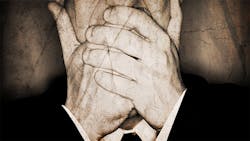“Equal justice under law” reads the inscription on the west pediment of the United States Supreme Court Building on First Street N.E. in Washington, D.C. Proposed for engraving by the building’s architects and approved by two Supreme Court justices in 1932, the four-word phrase captures a governing spirit of the ancient Greeks and a controlling principle of the Fourteenth Amendment to the Constitution of the United States.
Yet we the people continue to inquire about the nature of justice, the meaning of the word equal, the context in which the Constitution is to be considered, and even the very role of the Supreme Court of the United States.
That we continue to ask these questions, in which both business and labor have unmistakable stakes, persuades me that justice under law is not only fundamental national principle, but also an often-underappreciated process, a continuous process in which experience, reason, logic, emotion, philosophy, power, and politics are dynamic primary elements.
A case in point: Citizens United v. Federal Election Commission. The question before the Supreme Court in 2008 seemed simple enough. Does a non-profit corporation’s funding for advertising and broadcast of a self-produced movie critical of a candidate for federal office run afoul of the anti-corruption expenditure and disclosure requirements of the Bipartisan Campaign Reform Act of 2002?
The Court’s not-so-simple answer ultimately depended on how each of nine justices defined such terms corporate political speech, the essential nature of a corporation, the roles and effects of money in American politics, and the Constitutional guarantee of freedom of speech.
The [Citizens United] decision nevertheless left several significant matters unresolved."
In a controversial and remarkably ambitious 5-4 decision, the Supreme Court overturned judicial precedent, reasserted a corporation’s political speech rights, lifted a ban on corporate political funding independent of a specific candidate or the candidate’s campaign organization, affirmed the more-than-century-old status of corporations as individuals, elevated the exercise of reason, and asserted that more speech, not less speech, was a vital American tradition.
The decision nevertheless left several significant matters unresolved. Among them: whether for-profit corporations, unions and other associations of individuals have the same political speech rights and independent funding freedom the Supreme Court found for a non-profit corporation. Also left unresolved was whether U.S. subsidiaries of foreign-based corporations have the similar speech rights and funding freedoms.
Significantly, in only the past month, with uncertainty over who will fill the vacancy created by the death of Associate Justice Antonin Scalia and when that will happen, rose the question of which direction the Supreme Court might next move in squaring the rights of corporations and unions with Congressional efforts at political campaign finance reform. With or without a ninth justice, might the Court strike down legislative bans on direct contributions by corporations and unions to candidates and their campaigns? Or might the Court in deciding some future case, suggest in so many words that Congress provide for public funding of all federal elections?
This is another in a series of occasional essays by John S. McClenahen, an award-winning writer and photographer who for four decades covered international economics, public policy, and management principles for IndustryWeek.
About the Author
John McClenahen
Former Senior Editor, IndustryWeek
John S. McClenahen, is an occasional essayist on the Web site of IndustryWeek, the executive management publication from which he retired in 2006. He began his journalism career as a broadcast journalist at Westinghouse Broadcasting’s KYW in Cleveland, Ohio. In May 1967, he joined Penton Media Inc. in Cleveland and in September 1967 was transferred to Washington, DC, the base from which for nearly 40 years he wrote primarily about national and international economics and politics, and corporate social responsibility.
McClenahen, a native of Ohio now residing in Maryland, is an award-winning writer and photographer. He is the author of three books of poetry, most recently An Unexpected Poet (2013), and several books of photographs, including Black, White, and Shades of Grey (2014). He also is the author of a children’s book, Henry at His Beach (2014).
His photograph “Provincetown: Fog Rising 2004” was selected for the Smithsonian Institution’s 2011 juried exhibition Artists at Work and displayed in the S. Dillon Ripley Center at the Smithsonian Institution in Washington, D.C., from June until October 2011. Five of his photographs are in the collection of St. Lawrence University and displayed on campus in Canton, New York.
John McClenahen’s essay “Incorporating America: Whitman in Context” was designated one of the five best works published in The Journal of Graduate Liberal Studies during the twelve-year editorship of R. Barry Leavis of Rollins College. John McClenahen’s several journalism prizes include the coveted Jesse H. Neal Award. He also is the author of the commemorative poem “Upon 50 Years,” celebrating the fiftieth anniversary of the founding of Wolfson College Cambridge, and appearing in “The Wolfson Review.”
John McClenahen received a B.A. (English with a minor in government) from St. Lawrence University, an M.A., (English) from Western Reserve University, and a Master of Arts in Liberal Studies from Georgetown University, where he also pursued doctoral studies. At St. Lawrence University, he was elected to academic honor societies in English and government and to Omicron Delta Kappa, the University’s highest undergraduate honor. John McClenahen was a participant in the 32nd Annual Wharton Seminars for Journalists at the Wharton School at the University of Pennsylvania in Philadelphia. During the Easter Term of the 1986 academic year, John McClenahen was the first American to hold a prestigious Press Fellowship at Wolfson College, Cambridge, in the United Kingdom.
John McClenahen has served on the Editorial Board of Confluence: The Journal of Graduate Liberal Studies and was co-founder and first editor of Liberal Studies at Georgetown. He has been a volunteer researcher on the William Steinway Diary Project at the Smithsonian Institution, Washington, D.C., and has been an assistant professorial lecturer at The George Washington University in Washington, D.C.
